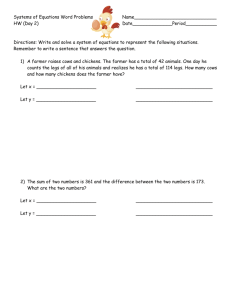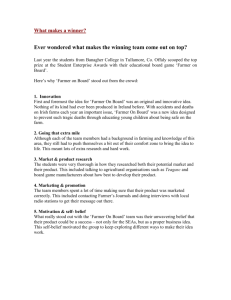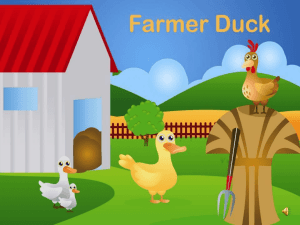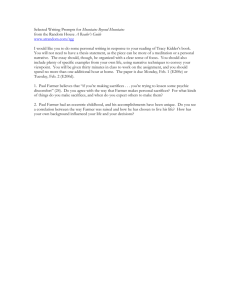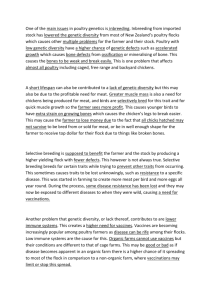Farmer's Markets
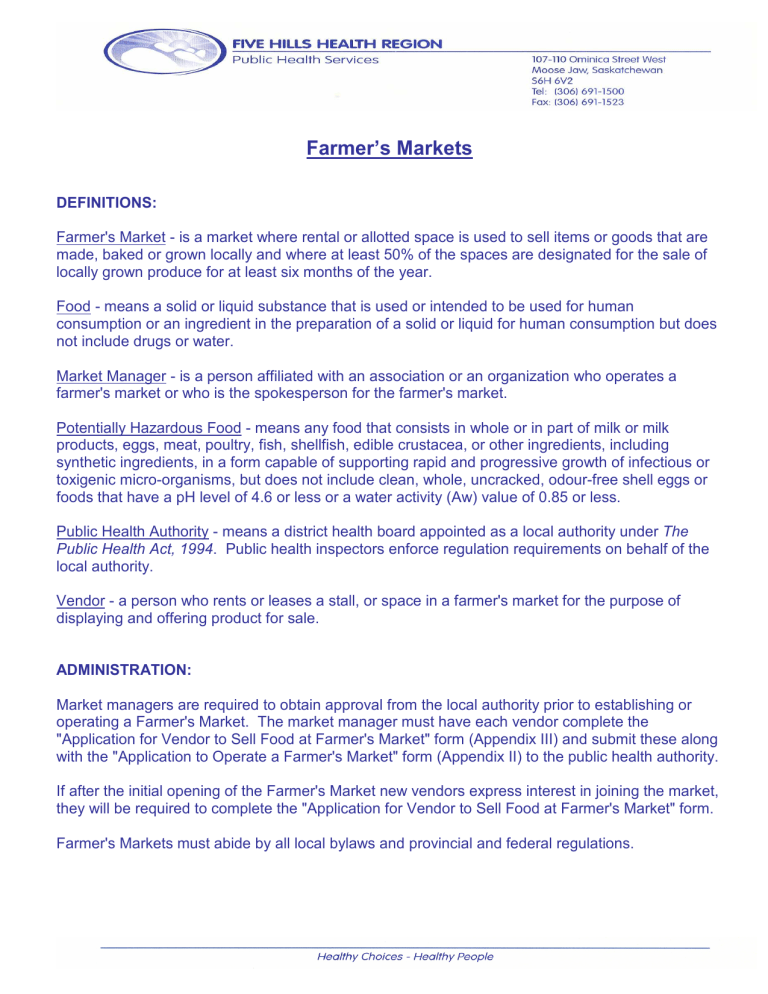
Farmer’s Markets
DEFINITIONS:
Farmer's Market - is a market where rental or allotted space is used to sell items or goods that are made, baked or grown locally and where at least 50% of the spaces are designated for the sale of locally grown produce for at least six months of the year.
Food - means a solid or liquid substance that is used or intended to be used for human consumption or an ingredient in the preparation of a solid or liquid for human consumption but does not include drugs or water.
Market Manager - is a person affiliated with an association or an organization who operates a farmer's market or who is the spokesperson for the farmer's market.
Potentially Hazardous Food - means any food that consists in whole or in part of milk or milk products, eggs, meat, poultry, fish, shellfish, edible crustacea, or other ingredients, including synthetic ingredients, in a form capable of supporting rapid and progressive growth of infectious or toxigenic micro-organisms, but does not include clean, whole, uncracked, odour-free shell eggs or foods that have a pH level of 4.6 or less or a water activity (Aw) value of 0.85 or less.
Public Health Authority - means a district health board appointed as a local authority under The
Public Health Act, 1994 . Public health inspectors enforce regulation requirements on behalf of the local authority.
Vendor - a person who rents or leases a stall, or space in a farmer's market for the purpose of displaying and offering product for sale.
ADMINISTRATION:
Market managers are required to obtain approval from the local authority prior to establishing or operating a Farmer's Market. The market manager must have each vendor complete the
"Application for Vendor to Sell Food at Farmer's Market" form (Appendix III) and submit these along with the "Application to Operate a Farmer's Market" form (Appendix II) to the public health authority.
If after the initial opening of the Farmer's Market new vendors express interest in joining the market, they will be required to complete the "Application for Vendor to Sell Food at Farmer's Market" form.
Farmer's Markets must abide by all local bylaws and provincial and federal regulations.
ENVIRONMENT:
Regardless of the type of building used for the Farmer's Market, the environment must be one that is suitable for the display and sale of food. Tables, counters, cases and shelves for the display of food must be smooth, impervious to moisture, easily cleanable and in good repair.
Where potentially hazardous foods are sold, every Farmer's Market should have facilities available to permit clean-up operations during and after the sale. Ideally, a handwash sink or a utility sink should be conveniently located for this purpose.
A sufficient number of refuse containers should be provided throughout the market area.
WASHROOMS:
Adequate washroom facilities shall be available for all vendors. These may be provided by the market management or be made available through written agreement with the owners of existing nearby facilities. Washrooms provided by the market manager must be equipped with liquid soap in a dispenser and single use towels and they must be cleaned and maintained in a sanitary manner.
Market managers must ensure these facilities are checked periodically during the market and cleaned as necessary.
VENDORS:
All food vendors are required to complete the "Application for Vendor to Sell Food at Farmer's
Market" form (Appendix III).
All vendors and all personnel handling food in a Farmer's Market must be clean and wear clean clothes. There is to be no smoking while working at a food vending outlet.
It is recommended that vendors selling processed food and personnel handling such food attend a course in safe foodhandling offered by the local authority.
FOOD:
All food items offered for sale at the Farmer's Market must meet the approval of the public health authority.
All meat and poultry must have been slaughtered in a licensed facility. The SALE OF FARM-
SLAUGHTERED ANIMALS OR POULTRY IS NOT PERMITTED.
The sale of raw or home pasteurized milk or milk products is not permitted.
Vendors selling fish (commercial fisherman and fish farmers) must be licensed to do so by
Saskatchewan Environment and Resource Management and must make such licence available to the market manager or the public health authority upon request.
Potentially hazardous foods must be handled with care. (Refer to Appendix I for a list of approved foods.) These foods must be maintained at certain temperatures, that is, keep cold foods cold
(below 4 o
C or 40 o
F), and keep frozen foods below
_
18 o
C (0 o
F). These temperatures must be maintained at all times including during storage, transportation, and when on display or prior to sale.
Potentially hazardous foods must also be protected from contamination by way of enclosure in display cases, packaging, or other means that prevent the customers from handling and possibly contaminating the product.
If the public health authority suspects a potentially hazardous food may have been prepared improperly or under unsanitary conditions, the vendor may be required to discontinue selling the product until further investigation. The local authority may inspect the facility in which this food was prepared. [Note: When investigating a suspected foodborne outbreak, the public health authority may collect food samples for this purpose].
Foods for immediate consumption such as sandwiches, soup, hot dogs, chili, stews, ice cream, etc. must be prepared at a facility licensed by the public health authority under the Public Eating
Establishment Regulations. Licensed facilities may be located in the market area.
PACKAGING/CONTAINERS:
Canadian Food Inspection Agency enforce regulations that address labelling issues. Labelling must show the following:
(1)
(2)
Common name of food;
Quantity or weight;
(3)
(4)
(5)
Ingredients in descending order of proportion;
Name and address of producer;
Durable life date of perishables.
Any questions regarding labelling should be directed to the Canadian Food Inspection Agency
(phone 975-4240).
Except for sanitized canning jars with new lids and rings, containers are not to be reused as food containers. Styrofoam food trays are not to be reused.
PRODUCT
1. Fruit
2. Vegetables
3. Honey
4. Meat
5. Fish
6. Poultry
7. Dairy Products
8. Baked Goods
9. Prepared/Processed
Foods: - cabbage rolls
(without meat)
- perogies
- pizza
- cured ham
- cured bacon
- pickled eggs
- jelly
- jam
- pickled vegetables
- relish
- candies
- fudge
- chocolate yes yes no no no no yes yes yes yes yes yes yes yes yes no no no no no
Permitted Foods
FRESH\UNREFRIG. yes
REFRIG. yes yes n/a yes yes yes yes yes yes yes yes yes yes n/a n/a n/a yes yes yes yes yes
FROZEN yes yes n/a yes yes yes yes yes n/a n/a n/a n/a n/a n/a n/a n/a yes yes yes yes yes
Notes
11, 8
3, 11
1
1, 2, 9
1, 9
1, 2, 9
10
4, 5, 9
1, 9
1, 9
1, 9
1
1
1, 5
1, 5
1, 5
5, 9
5, 9
5, 9
2, 9
2, 9
10. Eggs
1 11. Cold Frozen Drinks yes yes yes yes n/a yes
12
1, 6
12. Lunch Facilities 1, 7
*1.
*2.
*3.
Must meet all local bylaws, provincial and federal regulations.
Fresh or frozen meat or poultry products must be from an approved source.
No home preserved/canned vegetables or meat allowed, including those products that are pressure canned (except pickled vegetables and cucumber relish).
No cream filled or custard filled pastries, or pies with meringue. *4.
*5.
*6.
*7.
No products containing meat, milk or egg in filling or topping (exception - milk or egg in filling is acceptable if the product is baked).
Water must be from a source approved by the local authority.
Must meet provincial Public Eating Establishment Regulations.
*8.
*9.
Cut melons must be wrapped and refrigerated.
Product requires adequate protection from consumer handling.
*10. Only commercially pasteurized milk or milk products may be sold.
*11. Contact Canadian Food Inspection Agency (phone: 780-7478) for information related to the retailing of fresh fruit and vegetables.
*12. Cracked eggs are prohibited. For more information on the retailing of eggs in general, please contact Canadian Food
Inspection Agency (phone: 780-7112 - Regina).
NOTE: The food listed on this page applies to only farmer's markets. These foods cannot be retailed elsewhere unless approved by the appropriate government agency. Please contact your public health inspector for specific information.
